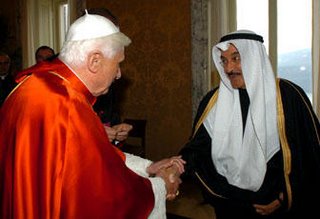
Some people in the media characterized the Pope as politically naïve, or worse, a divisive incompetent. Is he? Now that we have some distance between Muslim outrage and Benedict’s recent conciliatory moves, it’s probably a good time to look at the blowup a little more closely.
My own views are that Pope Benedict made a bold and calculated move to speak the truth to further the need for dialogue among Christians and Muslims, to awaken western nations from their stupor, and on that score he succeeded. Of course it remains to be seen how it will advance peace and goodwill.
The angry display by some Muslim protestors, the call for the Pope to be killed, the outbreaks of violence (a nun was gunned down – isolated act it was said - and some churches torched), etc proved exactly what the Pontiff was talking about: violence is irrational and should never be condoned by Islam or Christianity. Where there is violence, the onus to denounce it in the strongest possible language must come from authorities within the group perpetuating it – deliberately or unthinkingly – Christian or Muslim. Otherwise they prove once again that denial is not just a river in Egypt.
The Pope met envoys from 22 countries at his summer residence and a speech quoting his predecessor Pope John Paul II who spoke to young people at Casablanca in Morocco, "Respect and dialogue require reciprocity in all spheres, especially in that which concerns basic freedoms, more particularly religious freedom. They favour peace and agreement between peoples" (Pope Benedict's full message here)
George Friedman in his article Faith, Reason and Politics: Parsing the Pope's Remarks also suggests that the Pope's speech took the bull by its horn with 'superb misdirection':
“In fact, there is a logic here: If the Muslims reject Benedict's statement, they have to acknowledge the rationalist aspects of Islam. The burden is on the Ummah to lift the religion out of the hands of radicals and extremist scholars by demonstrating that Muslims can adhere to reason.So what next? In a New York Times report conservative Catholic and former Italian culture minister had this to say of the Pontiff: "I think this is just the beginning. I am sure Benedict XVI has many surprises in store for us. He is not afraid."
From an intellectual and political standpoint, therefore, Benedict's statement was an elegant move. He has strengthened his political base and perhaps legitimized a stronger response to anti-Catholic rhetoric in the Muslim world. And he has done it with superb misdirection. His options are open: He now can move away from the statement and let nature take its course, repudiate it and challenge Muslim leaders to do the same with regard to anti-Catholic statements or extend and expand the criticism of Islam that was implicit in the dialogue.” (Full article here)
2 comments:
Dear David,
Might be interesting to consider this:
http://tinyurl.co.uk/7v3l
He is your spiritual leader though and I can understand the need to look at the positives.
The problem with me, as with all issues and not just confined to this mind you, is I always find it difficult to live with the notion that the ends justify the means. Hence, my "constitutional schizophrenia" etc ad infinitum. ;)
Still, its an idealistic way of looking at life I suppose and this may not necessarily be practical.
Hi Nizam,
Ideals are tough and like you I too struggle. I also do not necessarily believe that ends always justify the means, but saying that invites the question, what means and what ends? Is the Pope justified in saying what he said just so he could challenge status quo and prod certain parties into dialogue? The point however is not just what he said, I’m sure, but if what he said had any basis in truth, if not popular perception. Ah well. We could argue until the cows come home.
About Juan Cole (isn’t this the man who tried to tell the world that Iranian president Ahmadinejad was mistakenly quoted in the Israeli map-wiping hoohah): Well, he may have a point but I disagree with his conclusion. It is one thing to argue academically - and it may be true that history bears out a different point of view regarding Islam’s existential impetus - but I remember what Boris Pasternak once said: “Facts mean nothing by themselves –not until a meaning is put into them.” (Dr Zhivago)
That ‘meaning’ would be the impulse which must inform all that is reasonable and true. A tree is known by its fruits, as Jesus once said. Kindness, love, respect, humility, joy, patience, peace, goodness, gentleness, self-control, etc – those are worthy fruits. Do the things we hold true promote these fruits? And do Christians and Muslims who believe in the nobility of their faiths (or for that matter any religious order or philosophy) exemplify these? Otherwise the descent into legalism is a short step away. And what does legalism lead to, if not fascism, sterility, and in its wake, death?
By the way, I am not catholic, so while I hold the Pontiff in high regard, I must respectfully decline his ‘leadership’ over me :)
Post a Comment